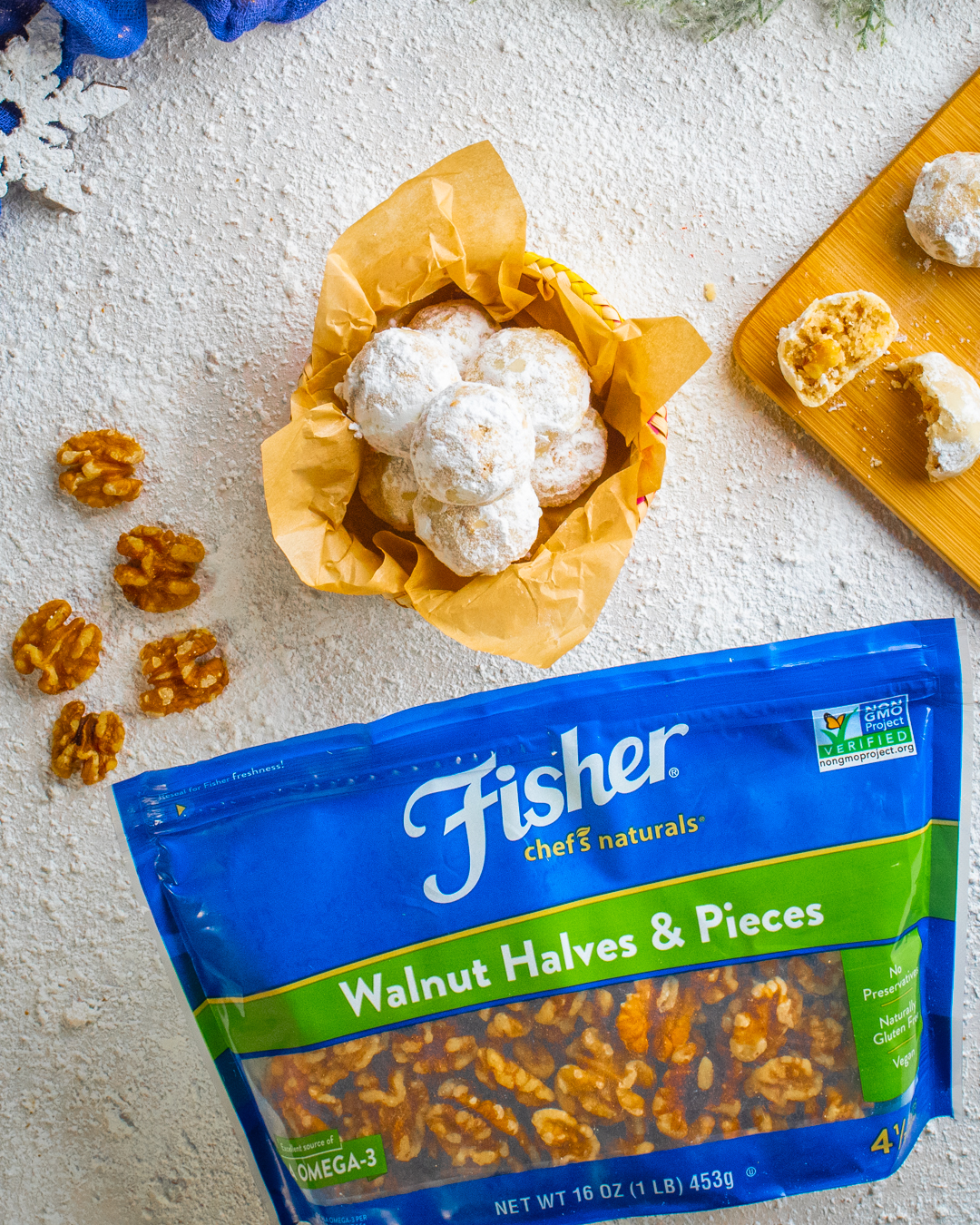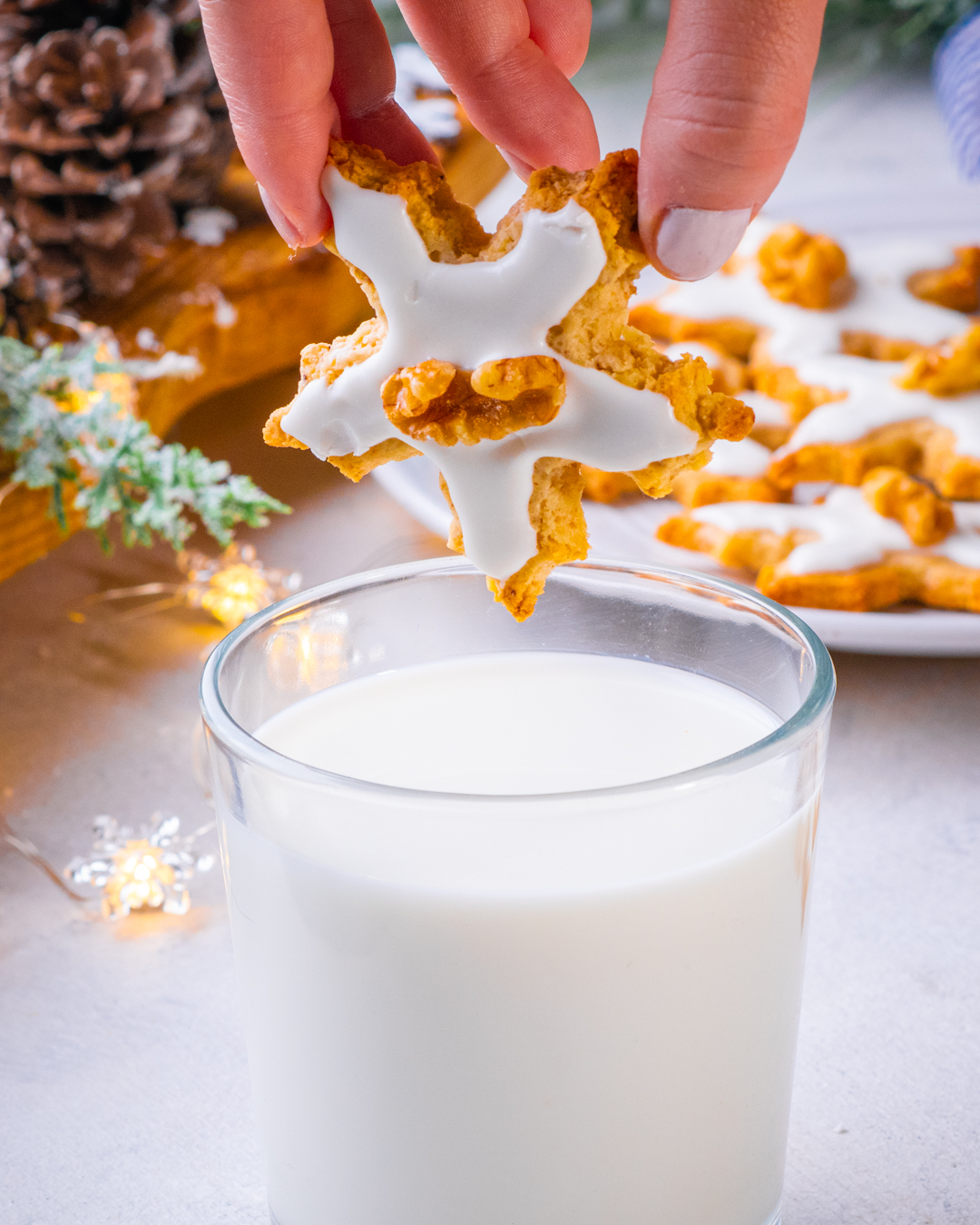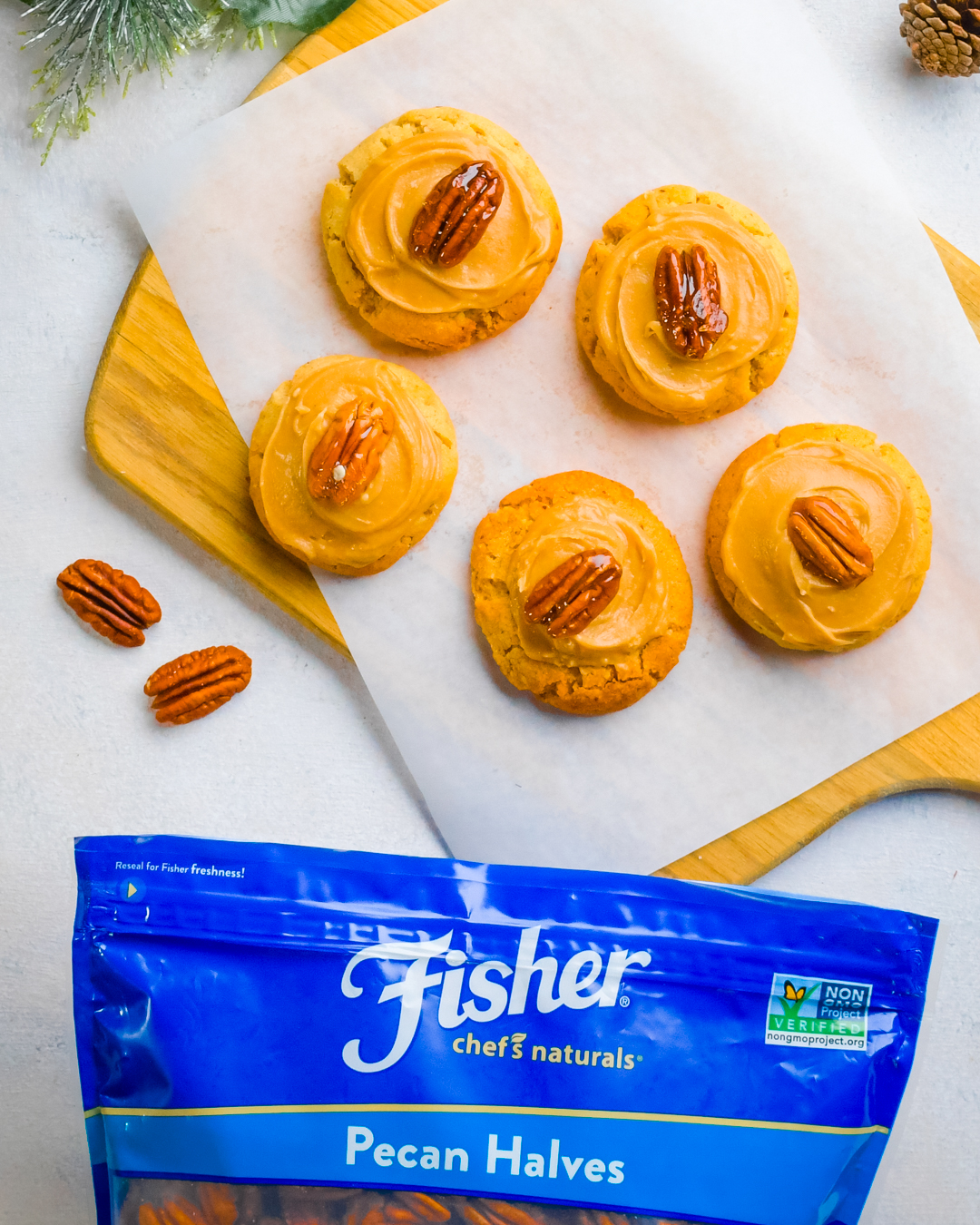Ah… the holiday season is approaching! The time of the year where the belts come off and our stomachs rumble in anticipation of all the yummy food.
But, we aren’t the only ones getting ready for a feast. There is a certain jolly visitor who’ll be craving a sweet treat after making his rounds to homes across the world. That visitor is none other than Santa Claus, who deserves a nice cold glass of milk and cookies after his global gift-giving spree!
To ensure Santa’s snack is absolutely unforgettable, we’ve partnered with our friends at Fisher® Nuts to bring you this extraordinary collection of cookies recipes! With cute, festive Walnut Holiday Cookies to the timeless Pecans Praline Sugar Cookies, Santa will definitely be dreaming of these treats until his next Christmas Eve visit!
So, pull out your aprons and preheat those ovens, because we’re about to embark on a culinary sleigh ride that promises to make your cookie plate the talk of the North Pole!

Butter Pecan Skillet Cookies
Difficulty: Easy • 8 Servings • Total Time: 50 Minutes
Ingredients:
- 1 cup Fisher® Pecan Halves
- 2 cup all-purpose flour
- ¾ cup brown sugar
- 2 eggs
- ½ cup granulated sugar
- 1 cup unsalted butter
- 1 tbsp vanilla extract
- ½ tsp baking soda
- ½ tsp salt
- 1 tbsp cinnamon
- ½ cup caramel topping
- 3 scoops vanilla ice cream
Directions:
- Preheat your oven to 350ºF.
- Melt the butter in a small saucepan over medium heat until it starts to brown, around 4 minutes. Remove from heat and transfer to the bowl of a stand mixer or other freezer safe bowl. Place the bowl in the freezer to chill for 10-15 minutes, until partially solidified.
- Spread the Fisher® Pecan Halves on a baking sheet, and toast in the oven for about 7 minutes, or until fragrant. Cool and chop into pieces.
- In a separate bowl, mix the all-purpose flour, baking soda, salt and cinnamon.
- Take the brown butter from the freezer and blend it with brown sugar and sugar for about 3 minutes or until light and fluffy. Add the eggs one by one until fully mixed, then add vanilla and blend again.
- Combine the flour mixture with the wet ingredients, stirring until everything is just combined. Add the chopped pecan halves and pour the cookie batter into a cast-iron pan.
- Bake the skillet cookie for 25 minutes until it turns golden brown. The center will be slightly gooey. Let it cool for 10 minutes, then serve with vanilla ice cream and caramel sauce.

Brownie Pecan Cookies
Difficulty: Easy • 8 Servings • Total Time: 1 Hour
Ingredients:
- 8 oz semi-sweet baking chocolate, chopped
- ½ cup butter
- 2 eggs
- ⅓ cup brown sugar
- ⅔ cup granulated sugar
- 1 tbsp vanilla extract
- ½ tsp baking powder
- pinch of salt
- ¼ cup cocoa powder
- 1 ¼ cup all-purpose flour
- 1 cup Fisher® Pecan Halves
Directions:
- Preheat the oven to 375ºF.
- In a small saucepan over medium heat, melt chocolate and butter together. Once melted, add cocoa powder, stir to combine and let cool.
- In a stand mixer with the paddle attachment, mix eggs, sugar, brown sugar, vanilla, baking powder and salt.
- Once the mix has thickened, add melted chocolate mix and flour. Finally, add the Fisher® Pecan Halves.
- Using an ice cream scoop, make dough balls and place on a sheet tray, about 2” apart from each other. Chill for 30 minutes.
- Bake for 10 minutes, until the edges are crisp but the center is still soft.

Melt In Your Mouth Walnut Snowball Cookies
Difficulty: Easy • 12 Servings • Total Time: 1 Hour
Ingredients:
- 1 ½ cup Fisher® Walnut Halves and Pieces
- 2 cup all-purpose flour
- ¾ cupbutter, softened
- 4 tbsp granulated sugar
- 2 tsp vanilla extract
- ¾ cup powdered sugar
Directions:
- Place Fisher® Walnut Halves and Pieces on a baking sheet tray and toast for 5 minutes, until golden. Once cooled, chop the walnuts.
- In a bowl, mix the walnuts, butter, vanilla and sugar. Once it’s integrated, add the flour in small batches.
- Chill dough in the refrigerator for 30 minutes.
- Shape into balls and bake at 325ºF for 15-20 minutes. Remove from the oven and let cool.
- Place powdered sugar in a bowl and coat the baked cookies with it. Finish with a walnut half for decoration, and enjoy!

Walnut Holiday Cookies
Difficulty: Easy • 15 Servings • Total Time: 4 Hours
Ingredients:
- 2 egg whites
- 8 oz Fisher® Walnut Halves and Pieces
- 1 cup flour
- ¾ cup caster sugar
- For the glaze
- 1 cup icing sugar
- 1 ½ tbsp water
- 1 tbsp heavy cream
Directions:
- Using a food processor, grind Fisher® Walnut Halves and Pieces until fully ground
- Separately, whisk egg whites and sugar until they form stiff peaks.
- Add the ground walnuts and flour to the egg whites, folding in carefully so the egg mixture doesn’t deflate.
- Roll the dough in between two sheets of parchment to about half an inch thickness.
- Use cookie cutters to shape your cookies. Place them on a sheet tray and let dry at room temperature for 2 hours on each side.
- Bake at 350ºF for about 10 minutes until lightly browned.
- Mix all ingredients for the glaze together, and frost the cookies!

Pecan Praline Sugar Cookies
Difficulty: Easy • 16 Servings • Total Time: 35 Minutes
Ingredients:
- ½ cup butter, softened
- ½ cup canola oil
- ½ cup granulated sugar
- ½ cup powdered sugar
- 1 large egg
- 2 tsp vanilla
- 2½ cup all-purpose flour
- 1 tsp baking soda
- 1 tsp cream of tartar
- ½ cup Fisher® Pecan Halves
For the icing
- ⅔ cupbutter
- ¾ cup packed brown sugar
- 1 tsp. vanilla
- ¼ cup heavy cream
- 1 ½ cup powdered sugar
- ½ cup Fisher® Pecan Halves
Directions:
- Preheat oven to 375ºF.
- Place Fisher® Pecan Halves inside a food processor and grind into a fine powder.
- Cream together the butter, oil and sugars in a stand mixer with paddle attachment. Separately, mix flour, pecan powder, baking soda and cream of tartar.
- Add egg and vanilla extract to the stand mixer. Then, add flour mixture gradually until everything is just combined. Be careful not to overwork the dough!
- Place spoonfuls of dough onto a lined baking sheet.
- Bake for 10 minutes, until edges are golden. Once out of the oven, let cool.
- For the icing: in a saucepan, melt the butter. Add brown sugar and vanilla. Cook until the sugar is dissolved, stirring constantly. Then add heavy cream and let boil about 5 minutes.
- Remove from heat and gradually add powdered sugar.
- Spread icing over cooled cookies and top with Fisher® Pecan Halves.

